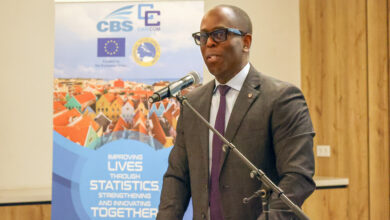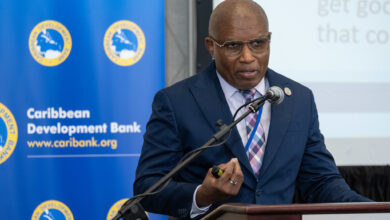(CARICOM Secretariat, Turkeyen, Greater Georgetown, Guyana) Governments in the Caribbean must strengthen their National Statistical Offices in respect of human, infrastructural and financial resources in order for statistics to make a meaningful contribution to regional development.
This is the view of Prof Chukwudum Uche, Professor of Demography in the Department of Sociology, Psychology and Social Work, University of the West Indies, Mona Jamaica, who delivered an address on Thursday 30 July, at the opening of the High Level Forum on Statistics at the Hyatt Regency in Port of Spain, Trinidad and Tobago.
The Forum was coordinated by the CARICOM Secretariat in collaboration with the Standing Committee of Caribbean Statisticians (SCCS) and the Organisation of Eastern Caribbean States (OECS) and with the assistance of International Development Partners including the Partnership in Statistics for Development in the 21st Century (PARIS21), the United Nations Department of Economic and Social Affairs, Small Island Development States (UNDESA SIDS) and the United Nations Economic Commission for Latin American and the Caribbean (UNECLAC).
Professor Uche identified the capacity building of regional statisticians; the strengthening of national statistical offices; and access to data and the protection of human rights as four critical components in the development of statistics in the Caribbean Region. “Money is tight, and will continue to be so in future. But I have learnt one thing about governments. It is this: if a government has a pet project, it will find enough money and other necessary resources for it. I plead to governments: Make national statistical development a pet project, a priority,” he said.
Notwithstanding the importance of capacity building and the need to enhance key infrastructures, Professor Uche added that the access to data and the protection of human rights were two other critical components in the development of statistics in the Region. Particularly, he said, the publication of statistical data should not threaten the human rights of any individual. “The protection of respondents’ records, including matters of anonymity and confidentiality must be at the forefront of the responsibility of any data manager in a modern democratic society,” Professor Uche stated.
“Governments should not be in the business of blocking the publication of research findings by their agencies that show uncomfortable levels of infant, childhood or maternal mortality, unemployment, economic growth or decline, crime or domestic violence,” he said. He noted that access to data by the wider citizenry was also essential as they would need to use national data for informed discussion on matters of national or regional concern. “To do this properly and professionally, we need access to data with minimal limitations. If governments begin to direct the timing of the release of data that may give its opponents some ammunition, then democracy and good governance are under threat,” the professor stated.
The High-Level Advocacy Forum on Statistics was convened under the theme: The Urgency of Statistics, Enabling Development in the Caribbean Community. One of its expected outcomes was the strengthening of inter-agency collaboration for the development of a joint approach to provide the investment and support required for building institutional capacity and infrastructure necessary for the development of statistics in the Region.





